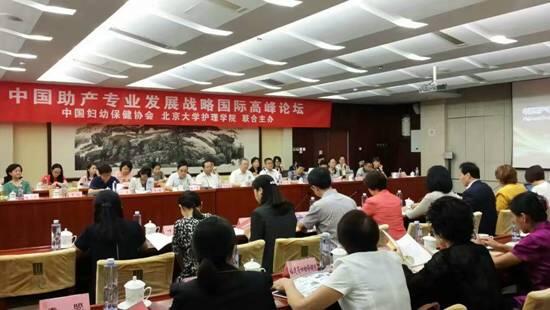Distinguished Mr. Zhang Wenkang, President of the China Maternal and Child Health Association,
Ms. Frances Day-Stirk, President of the International Confederation of Midwives,
Dr. Zhan Qimin, President of the Peking University Health Science Center,
Dr. Qin Geng, Director-General of the National Health and Family Planning Commission,
Dr. Qin Huaijin, Director-General the National Health and Family Planning Commission,
Dear friends, colleagues, ladies and gentleman,
On behalf of the United Nations Population Fund (UNFPA), it is my pleasure to deliver remarks on the occasion of the High-level Forum on Midwifery Development in China. I would like to thank the China Maternal and Childr Health Association (CMCHA) and the Nursing School of Peking University for convening this important event.
Worldwide, midwives are the main caregivers for women and their newborns during pregnancy, labor, childbirth and in the post-delivery period. When educated as per international standards and supported within a functional health system, midwives can provide up to 87 percent of the essential care to women and newborns. A well-trained midwife can provide comprehensive sexual and reproductive health information and services including antenatal care, safe delivery care, post-natal care, family planning counselling and services, prevention of mother-to-child transmission of HIV and reproductive health services to adolescents. High-quality midwifery care for women and newborns saves lives and contributes to healthy families and more productive communities. In fact, investing in midwifery education and in quality community-based midwifery services, have been shown to be “BEST BUYs” in primary health care, with very high returns on investment.
As such, midwives will continue to play a pivotal role in achieving the Sustainable Development Goals by 2030 and the Global Strategy for Women’s, Children’s and Adolescents’ Health of the United Nations Secretary General – both of which the Government of China is highly committed to. This commitment is reflected in the 13th Five Year Plan and other relevant strategies. For example, ‘Healthy China 2030’ illustrates the Chinese Government’s dedication to further strengthen the primary health care, including midwifery.
UNFPA, together with a large network of partners, works at the global, regional and national level to help build a competent, well-trained and well-supported midwifery workforce in low-resource settings. UNFPA and its partners work to strengthen midwifery training, institutions, associations and regulations. For example, from 2008 to 2013, a joint programme between UNFPA and International Confederation of Midwives (ICM) helped to launch midwifery action plans in 23 countries. Today, UNFPA is supporting more than 65 countries to strengthen their midwifery workforce and policies. In countries with low resources and national capacity, senior UNFPA midwife advisors provide dedicated support to local efforts in strengthening midwifery. UNFPA also builds expertise through the dissemination of guidance and good practices, which help policymakers and health professionals learn from experiences around the world, including through South-South Cooperation.
Since 2011, in close collaboration with the former Ministry of Health and now the National Health and Family Planning Commission, UNFPA has been working with the CMCHA, the Nursing and Public Health Schools of Peking University, and the Health Department of Hunan Province towards a more favorable policy environment for midwifery development in China. We are pleased that the collaboration with this wide range of stakeholders, including the government, NGOs, academic institutions has contributed to notable accomplishments such as the establishment of a midwifery bachelor’s degree programme in eight universities, the enrolment of nine standardized midwives training bases and setting up the China Midwives’ Society of the CMCHA.
In the new cycle of cooperation between the Government of China and UNFPA, which started this year and will run until 2020, we are committed to continue supporting the efforts of the national partners in developing a quality midwifery workforce. In particular, the focus of collaboration in the next five years will be on evidence-based advocacy and advisory services towards a policy environment that recognizes midwifery as a distinct profession in the health system. This recognition is expected to facilitate more investments in quality education and training for new and current midwives, promote high standards for midwifery service delivery, and ultimately result in better quality of care to expectant mothers and newborns in China.
As China continues to improve maternal and newborn health, international cooperation and knowledge exchange, especially with other developing countries through South-South Cooperation, provide great opportunities for China to learn from other countries’ experience, but also to share its extraordinary achievements to date, including in reducing maternal mortality. Building on its global networks and expertise, UNFPA stands ready to facilitate further international cooperation in midwifery.
I am glad to see that participants of the Forum come from a diverse community of midwifery advocates, including policy makers, especially from non-health sectors, professionals from universities and training bases, board members of midwifery association, and international organizations. This Forum provides a good opportunity to bring us together to discuss midwifery development strategies in China from various perspectives. Multi-sectoral collaboration and joint efforts are needed to fulfil the unfinished agenda of promoting women’s, adolescents and children health. UNFPA remains committed to continue working together with you, and build on years of fruitful collaboration to meet the challenges and reach greater achievements. .
I wish you a successful meeting and look forward to the discussions.
Thank you very much! Xie xie!


